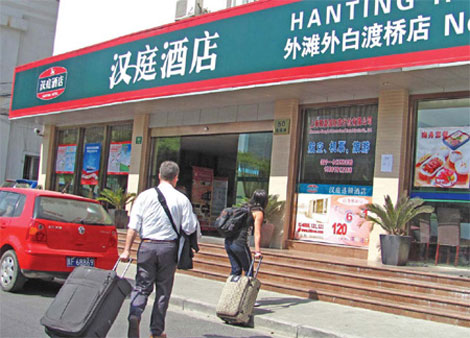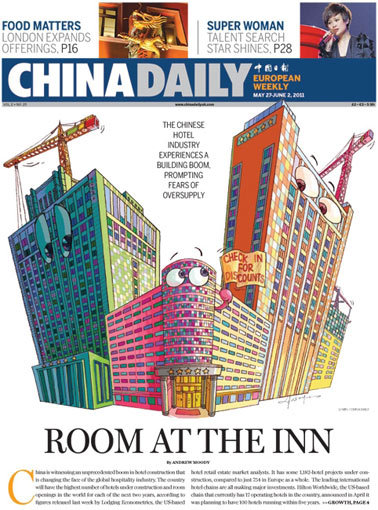Chinese hoteliers making room for global expansion
Updated: 2011-05-27 10:47
By Lin Jing (China Daily European Weekly)
 |
|
A HanTing Hotel in Shanghai. HanTing, with more than 350 hotels, is looking to enter the global market through acquisitions. Wu Changqing / for China Daily |
Country's rapid economic growth a great opportunity to lay 'solid foundation'
Chinese hoteliers are looking to buy even more hotels globally as they seek deals brought about by the financial crisis, industry analysts and hotel operators say.
On May 11, HNA Group, the parent company of Hainan Airlines, signed an agreement to pay 431.6 million euros for a 20 percent stake in Spain's NH Hoteles, which currently runs 400 chain hotels in 25 countries, mainly in Europe, Latin America and Africa.
HNA's businesses cover the air transportation, hotel, and tourism-related industries. Hainan Airlines has air routes in Europe, including flights from Beijing to Berlin, Budapest and Brussels.
The deal is seen as another step forward for Chinese investors entering the hotel business in the West.
In January, the Sheraton Universal Hotel in Los Angeles was bought by the Shenzhen New World Group, which last year bought the Los Angeles Marriott Downtown Hotel.
Last year, the US-based hotel management company Interstate Hotels & Resorts was also bought by a joint venture between the Shanghai Jin Jiang International Hotels (Group) Company Limited and a US hotel investment company, Thayer Lodging Group, for about $300 million (213 million euros).
Before the deal, Interstate and its affiliates manage and/or have ownership interests in more than 225 hotels with about 46,000 rooms in the US, Belgium, Canada, the UK, India, Mexico and Russia.
HanTing Inns and Hotels, one of China's leading chains, is similarly looking to expand its operations by looking at hotels in the West.
"Tapping the international market is a natural move as Chinese hotel operators grow up," says Wu Jiajun, PR manager of HanTing Inns and Hotels, which operates an economy hotel chain in China, with more than 350 hotels in 55 cities.
The company has no establishments outside China, but Wu says HanTing is aiming to enter the global market and that Western hotels top its list.
"The rapid economic growth in China has provided us a great opportunity for us to gain enough revenue and lay a solid foundation to compete in the world market with well-established hotels," Wu says.
Han Ming, president of the China Hotel Association (CHA), says Chinese hotel chains have grown by leaps and bounds, and are able to compete well in the international market.
"In the past 10 years, China's hotel industry has experienced fast development, both in quality and quantity," Han says.
"Since 2000, the total revenue of the whole industry has presented an annual growth rate of at least 10 percent."
Statistics from CHA show that there are about 300,000 hotels in China, with about 11,000 with at least a four-star rating.
"The flourishing Chinese economy has nurtured many big hotel groups that have gained popularity and set up their hotel networks in the domestic market," he says.
Han says these groups have reached international levels in terms of hardware facilities, with some even better than foreign counterparts.
Analysts say Western markets offer good opportunities.
Yang Honghao, a researcher with the China Tourism Academy (CTA), says it is likely that mergers and acquisitions will take place in developed markets such as the US and Europe as "the financial crisis and the sluggish tourist sector there have created some good bargains".
"The comparatively lower valuation of hotel assets in the West and the increasing purchasing power of the yuan have made Chinese enterprises enthusiastic about the Western hotel industry," Yang says.
Yang says M&A of internationally renowned hotels could gain Chinese hotels more competitive edges and build platforms for further expansion.
"They could familiarize themselves with global market and set up business networks; meanwhile, they could also have their own personnel trained and better international brand awareness," Yang says.
Huang Wei, chairman of the New World, which bought the Sheraton Universal and Marriott Downtown, says the position and the potential for future development of the Sheraton are what the group values most.
He says the nearby Universal Studios in Hollywood will also help attract a steady tourist flow.
Huang says New World will continue to look for other opportunities in the US.
Jin Jiang, now co-owner of the InterContinental group, is principally engaged in hotel operations and management in China.
Yu Minliang, chairman of Jin Jiang, says the acquisition will increase the company's core competitiveness.
"This is the first time that a Chinese hotel expanded in the international market by purchasing a US-listed company," he says.
Yu says the move will also "enhance our management level, further promote our global brand and accelerate our ability to expand in the international market".
He says Jin Jiang aims to carry out more mergers and acquisitions internationally.
Another reason for Chinese investors being interested in the West is because of the growing number of Chinese outbound tourists.
According to research from CTA, in 2010, China reported a 20.4 percent growth in number of outbound trips, reaching 57.4 million.
In 2011, the expected number will be 65 million, increasing by 13 percent.
Figures from IPK International, a tourism consulting group based in Germany, show that about 25 percent of Chinese tourists would take Europe, especially Germany, Italy and France as their first choice of overseas travel.
China has also overtaken Japan to become the largest source of tourists from Asia to Europe.
Up till November 2010, 742,900 tourists from the Chinese mainland traveled to the US, a 54 percent growth compared to 2009.
This has provided a solid customer base, says Han from the CHA.
"Chinese tourists will prefer hotels they are more familiar with."
But he warned of the risk of overseas expansion.
"The whole legal and policy environment is more complicated than in China," Han says.
"Before making a move, Chinese enterprises should fully prepare themselves and make thorough investigations on local laws and regulations concerning taxation, investment and employment."
Han says Chinese enterprises should change their form of investment to ensure a steady return in the global market.
"Overseas expansion is a meaningful step that claims the existence of Chinese hotel brands in the global market. But at the current stage, their expansion is still limited to capital investment, which is of great financial risk in times of economic downturn," Han says.
"Chinese hotels should build up their reputation and increase their brand value internationally, and then invest in forms of brand licensing and management services output."
E-paper

Thawing out
After a deep freeze in sales during the recession, China’s air conditioner makers are bouncing back
Preview of the coming issue
Cool Iron lady
Of good and evil
Specials

Memory lanes
Shanghai’s historic ALLEYS not just unique architecture but a way of life

Great expectations
Hong Kong-born singer songwriter rises to the top of the UK pops.

A diplomat of character
Belgian envoy draws on personal fascination to help build China ties.
